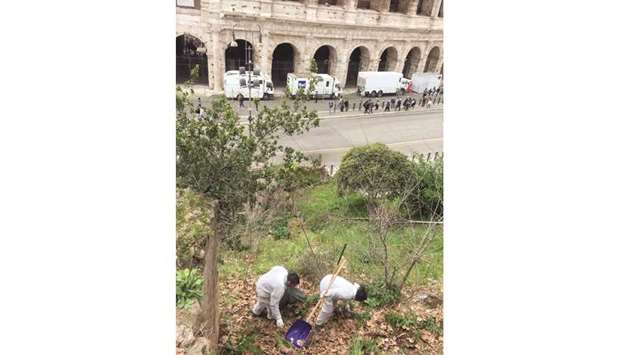Rome has enlisted an unlikely group to help clean its streets and parks: prisoners. Residents and tourists seem unruffled by the city’s low-cost beautifying efforts - and see even more work inmates can do.
The area around Rome’s Colosseum is already chaotic, with masses of tourists pushing their way daily into one of Italy’s most famous monuments. Now, prisoners have been added to the mix.
The men, wearing white overalls, appeared recently near the world-famous landmark, hauling bin bags over their shoulders under the constant surveillance of nearby police officers standing guard.
They have been tasked with cleaning up the Colle Oppio, a rundown park next to the Colosseum built over the underground ruins of the Domus Aurea, Emperor Nero’s grandiose ‘Golden House’.
On a recent day, 18 prisoners arrived at the park, stepping out of a small bus from Rebibbia prison, one of the largest in Italy.
Rome’s city council, plagued by trash and low on cash, has enlisted prisoners’ help as part of a pilot project involving the Ministry of Justice and prison authorities.
The city, its residents and the prisoners all benefit from the scheme, says Gabriella Stramaccioni, Rome’s public ombudswoman for prisoners’ rights.
“It’s a way for them to give something back to society and a way for us to get the prisoners involved for the benefit of the community,” City Hall Alderman Daniele Frongia says.
Once the Colosseum area is cleaned up, inmates are to turn their attention over the next six months to other squares and parks in central Rome.
Next on their chore list is Rome’s outskirts, as well as sports fields and other facilities, such as libraries.
“These are men who received relatively mild sentences, who have behaved well and who have a maximum of two years left to serve,” Stramaccioni says.
Murder convicts are not chosen for street clean-up duty, she adds, and for each prisoner, there is an officer keeping watch. The prisoners do not wear any electronic ankle monitors.
Tourists seem to like the project.
“Before they wear a hole in the floor of their cells, this is better for them,” commented Danny Drath, travelling with his family from northern Germany and watching the prisoners.
“We’re not afraid. It is really good that they can be useful.”
The concept is far from new, with inmates often enlisted to clean up highways and public spaces in the United States as a way to get them out of their cells as well as save taxpayer dollars on public works.
There certainly is a lot for them to do in Rome.
After snowfall this past winter, many parks remain closed, weather-damaged trees are in danger of toppling over, and rubbish is piled up. Having prisoners pitch in with cleaning is just practical.
Stramaccioni says they might also prove helpful in repairing Rome’s damaged streets. The city’s residents have been driven mad by the plague of potholes caused by the freezing and thawing temperatures.
In some cases, the potholes are metres deep, swallowing entire cars.
Some Romans try to make light of the situation, having contests as to who can claim the most potholes outside their front door.
The municipality has announced a pothole “Marshall Plan,” whereby within 30 days, at least 50,000 holes are to be filled up. But many people are sceptical about concrete results.
A volunteer group called Tappami (fill me up) has taken the matter into its own hands, with volunteers filling up potholes on their own without waiting around for city hall to do the job.
Prisoners would be welcome as well, says project initiator Cristiano Davoli. “Everyone who helps to make this city more liveable again is welcome,” he adds.
Rome, engulfed by crippling debts and failing public services, is suffering from endemic problems such as garbage collection and public transport.
In an annual quality of life survey for Italy’s 110 provinces, published in November by business daily Il Sole 24 Ore, Rome was ranked 24th, down 11 positions from 2016.
Current Mayor Virginia Raggi of the anti-establishment Five Star Movement was elected by a landslide in 2016 after a major corruption scandal discredited her left-wing and right-wing rivals.
Since then, she has struggled to turn the city around, amid infighting and resignations within her administration, and accusations of inexperience and incompetence. – DPA

UNDER WATCH: Prisoners, wearing white overalls, clean up rubbish around the Colosseum under the constant surveillance of police officers standing guard.
